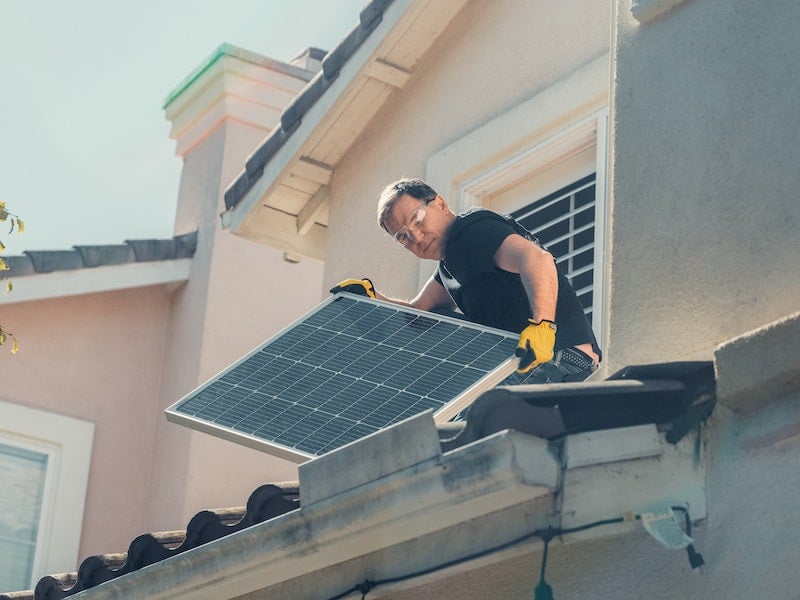
Are Solar Panels Right for Your Business?
Find out if solar panels are the right choice for your business.
Is solar right for you?
Find out in less than a minute.
Using renewable energy from solar panels preserves the environment and serves your business. In addition to their environmental and social benefits, solar panels give the companies that use them a competitive edge. They can reduce your energy expenses, offer long-term independence and sustainability and strengthen your brand. Installing solar panels might be the right project for your business.
The Benefits of Solar Panels for Businesses
Solar panels for businesses offer a wide range of practical and financial benefits. Investing in solar is a fast, efficient way to improve your business. Some of the reasons to plan a solar energy installation project include the following.
1. Decreased Overhead Costs
One of the most expensive overhead costs for companies is energy. Companies spend thousands of dollars per year on the electricity they need to operate. Costs are even more burdensome for industries that use large machinery or equipment.
Installing solar panels is one strategy for saving on energy expenses. If you stay connected to the grid and use net-metering to offset costs, you could cut back or even eliminate your energy expenses. If you prefer complete independence from the grid, you can use solar storage batteries to eliminate utility expenses.
Whether you rely on net metering or opt for complete energy independence, you'll find solar an economic choice. The cost of renewables, especially solar power, has been steadily decreasing for years. Over the course of the last four decades, photovoltaic (PV) solar power costs have fallen by 99%, thanks to technological and manufacturing improvements. Costs should continue to fall with new research and development.
2. Better Predictability of Expenses
The costs of oil and natural gas fluctuate from month to month and year to year, and usage can vary from one bill to the next. Several factors can cause rates to rise, such as demand, source availability and national economic health. The fluctuation can make it incredibly challenging to plan your business expenses.
Better predictability is another benefit of solar panels. When you install solar panels, you'll pay a regular rental fee or loan payment — depending on whether you rented or bought your panels — rather than a fluctuating electricity bill. Solar presents an ideal way to overcome inflating energy expenses.
3. Grid Independence
Another reason to install solar panels is the independence they will afford your business. If your solar panels operate off-grid, your solar batteries will continue to provide you with energy during emergencies. Even if the grid shuts down, your electricity source will remain stable. In many industries, the ability to retain electricity can save companies thousands upon thousands of dollars. For example, businesses in industries that rely on cold storage cannot risk losing electricity during an emergency.
4. Better Public Image
Solar panels will also improve your company's public image, resulting in a stronger brand reputation and increased revenue. Investing in green energy decreases carbon emissions and pollution while creating a sustainable future. Consumers place responsibility on companies to do their part by engaging in sustainable practices.
Among consumers in the United States and the United Kingdom, 88% want brands to help them become more environmentally friendly and ethical, but 43% say brands make it harder. Using green, renewable energy can help you stand out among competitors.

5. Increased Long-Term Sustainability
Several factors point to a future less reliant on fossil fuels. Increasing public demand for sustainability is a major driving influence. In the years to come, fossil fuel providers may have to comply with tougher regulations and requirements, the costs of which would be passed on to consumers. Investing in solar power gives companies a head start in a changing world. If you want to stay ahead of the curve and prepared for the future, solar is the right choice for you.
6. Incentive Programs
Incentive programs represent another financial benefit of solar energy. Tax credits and financing programs are designed to make solar panels for small businesses and homeowners affordable. Take a look at available state and local incentive programs. They can reduce solar upfront costs and increase your return on investment. Legislation changes often, so it's important to keep an eye out for new incentives.
How Much Do Solar Panels Cost for Businesses?
If you're serious about a potential solar investment, you'll need to know how much solar panels cost for a business. Of course, the expense will vary depending on a number of influences. Here are some of the factors that may affect your solar investment cost.
1. The Scale of Your Business
One of the most significant factors will be the scale of your business. How much electricity do you use in an average month? You'll need enough panels to meet your energy needs if you want to see real savings. The more panels you need, the more expensive the initial cost will be.
2. The Type of Panels You Choose
Several types of solar panels are available, and some have better efficiency and durability than others. Although the latest technology is costlier, it may be worth the expense in the long run. For instance, thin-film solar panels cost less than crystalline panels, but they have less durability and efficiency. Though crystalline panels are more expensive, they may save you on future repair costs and help you generate more electricity over time.
3. Where You Live
Your location is another factor to consider. Some geographic areas have more reliable access to sunlight than others. Solar panels may represent a stronger investment in the southwestern United States than elsewhere, though they can benefit a business in any region. Local politics can also affect your expenses, as some states and cities offer better incentive programs than others.
4. Your Access to Incentives and Tax Credits
In determining the cost of your solar panels, be sure to remember all the incentives and credits available. All business owners in the United States have access to the federal tax credit, which is usually worth about $4,000 to $6,000 depending on the scale of the project. This credit can put a sizable dent in the overall cost of your solar panels.
Many states and regions offer their own incentives for renewable energy projects and other environmental initiatives. You can find relevant programs in your area using our database tool. When added up, incentives and credits can make solar projects much more affordable for business owners.

5. Your Level of Reliance on the Grid
Whether you choose to operate on-grid or off-grid will also impact your solar costs. A system with a battery may have a higher upfront cost, but it will allow you to function without help from your utility company. If you value complete energy independence, a battery is the way to go. That said, staying on-grid works for many businesses. While on-grid, you can take advantage of your utility company's net-metering program.
Net-metering allows you to use energy from the grid if you need it. When your panels produce more than you need, the excess will go to your utility company, earning you a credit per kilowatt-hour. When your panels produce less than you need, you can take energy from the grid, paying your set rate. In many cases, the credits offset the rates, completely eliminating energy expenses.
Whether you choose to operate on-grid or off-grid, your solar panel will save you money. However, the choice will impact your initial installation expenses, so be sure to consider your options.
6. Your Installation Site
Another factor affecting solar cost is the installation site. You'll have to decide where you want your solar panels installed. Most businesses find it helpful to meet with a consultant to help select the best site. You might choose ground- or roof-mounted installation depending on your access to sunlight. The cost of installation will depend on how challenging the job is.
Ground-mounted systems are often more expensive to install upfront. Roof-mounted systems pose their own challenges, though. You might find your roof needs replacing or repairing before solar installation is possible, which will increase costs. An irregular roof with various angles might complicate installation, too, increasing your expense.
Before any renewable energy project, you have to make sure you comply with all laws and regulations to minimize legal and safety risks. You'll have to measure environmental impact and obtain all the necessary permits. Depending on your installation site selection, due diligence might be costly and time-consuming. Be sure to partner with a consultant or other service to protect your business.
Are Solar Panels Worth It for Businesses?
If you're on the fence about installing solar panels, think about all of the immediate and long-term benefits they'll offer your business. With decreasing prices and increasing incentive programs, now is an excellent time to invest in solar. Regardless of the size, scale and nature of your business, solar panels offer an unmatched return on investment.
Contact EnergyBot to Learn More About Energy for Businesses
Investing in solar technology is one way your business can reduce energy-related costs. Choosing the right plan and provider can serve the same purpose. At EnergyBot, we provide local support and free instant quotes, offering the lowest rates you can find online — guaranteed. Our average customer saves 20% per month on their electric bill. You can decrease your energy expenses with EnergyBot. Get started today.
Written by Thad Warren
Thad is a native Texan who has worked in the energy industry for just over 5 years.
Connect
Recent Posts
Compare Texas Solar Buyback Plans
Discover the best Texas solar energy buy back programs for 2025! Compare rates, terms, and providers to maximize savings and make the most of your solar investment.
September 2025

7 minutes

How Efficient Are Solar Panels
How efficient are solar panels compared to other types of energy generation?
March 2023

4 minutes

What You Need To Know About The California Solar Mandate
Learn how the California Solar Mandate changes how new homes are built.
July 2023

4 minutes


